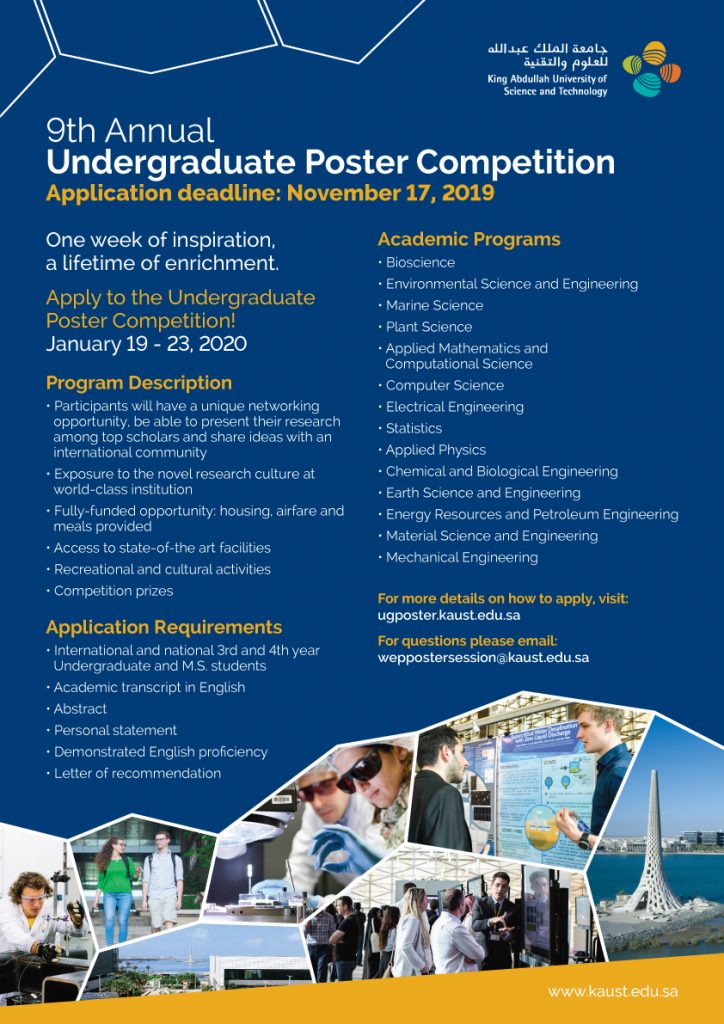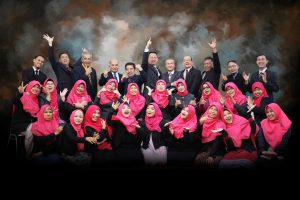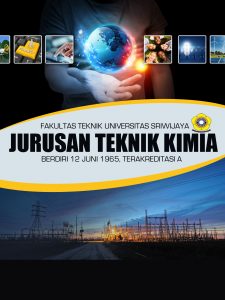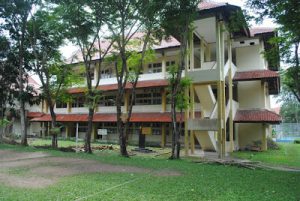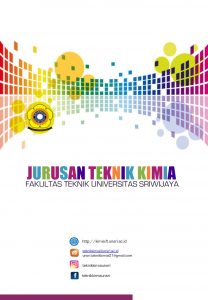9th Annual Undergraduate Poster Competition (Apply now)
January 19-23, 2020 (Deadline: November 17, 2019)
Share Your Ideas
January 19-23, 2020
The annual undergraduate poster competition is an opportunity for students to share their research with peers in an international environment while experiencing the academic culture at KAUST. The poster competition will take place during the Winter Enrichment Program, from January 19-23, 2020 offering undergraduate students an opportunity to share their ideas from world-class faculty and researchers. While at KAUST, participants will learn about what’s next within a range of scientific and technology research areas. They will also present posters in a competition-style environment, visit our state-of-the art facilities, and make friends with peers from across the globe. In addition, they will take part in recreational and cultural activities, from snorkeling in the Red Sea to learning more about the rich history of Saudi Arabia.
Application Requirements
- International and national 3rd and 4th year undergraduate and MS students
- 3.5/4.00 GPA
- Academic Transcript in English
- Research Abstract
- Personal Statement indicating student’s academic and research background and their motivation for applying to the program, and long-term academic plans
- Demonstrated English reading comprehension, speaking, listening and writing abilities
- Letter of Recommendation
Abstract Guidelines
The research abstract should:
- Be related to the research topics below
- Describe background and objective of the topic researched
- Provide concise summary of the research design, methodology or analytical procedures used
- Include results/conclusions and significance to the relevant field of study
- Be between 300 and 500 words
Participants agree that their abstract/poster may be featured in KAUST publications and/or included on the KAUST website.
Participants must submit individually.
Research topics
Biological, Environmental Science and Engineering (BESE)
Computational Biology; Bioengineering; Food and Water Security; Environmental Microbiology; Biomedical Research; Adaptive Biology; Biophysics; Epigenetics; System Biology; Plant Biology; Marine Biology
Computer, Electrical and Mathematical Sciences and Engineering (CEMSE)
Digital Transformation, Machine Learning; AI; Visual Computing; Bioinformatics; Big Data; Extreme Computing; Development of Communication Networks; CMOS integrated circuits; Electronic and Optics/Photonics devices; Micro-Electro-Mechanical Systems (MEMS); various types of Sensors; Measurement and Detection Devices; Functional- and Nano-Materials; Biostatistics; Computational Statistics; Data Visualization; Environmental Statistics; Extreme Events; Spatial Statistics; Statistical Data Science; Time Series Analysis;Mathematical and Numerical Analysis, Partial Differential Equations, Applied Probability, Applied Geometry, Uncertainty Quantification, Mathematical Modelling and Scientific Computing, including applications to biological and physical systems, machine learning, mathematical economics and finance, control, material sciences, and fluid dynamics.
Physical Science and Engineering (PSE)
Energy Efficiency, Future fuels and clean combustion; Composite and Heterogeneous Materials; Mechatronics and robotics; Bubbles and fluids; Sustainability; Energy-Water Nexus; Sensors; Advanced Materials; Atmospheric Processes and Ocean Circulation, Oil Exploration and Reservoir Modelling, Earthquake Processes and Crustal Deformation; Development of new Materials and Processes for Gas and Liquid Separations, for Water Desalination, Catalysis, Sustainable Energy and Nanotechnology;Condensed Matter Physics; Light-matter interaction; Quantum computing/quantum communications
